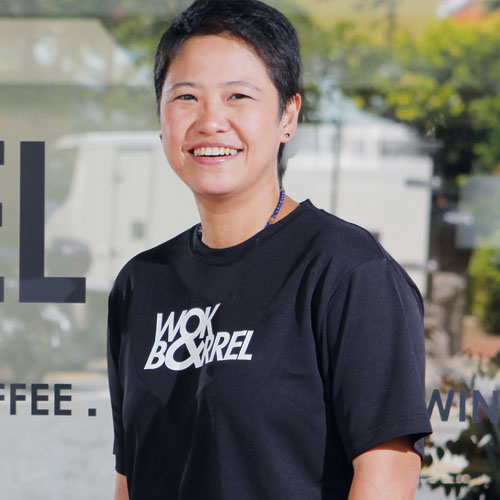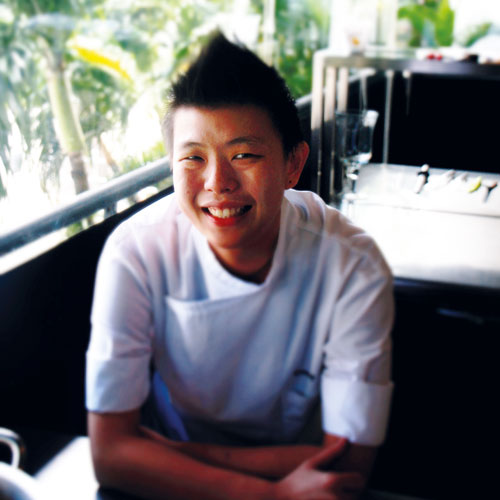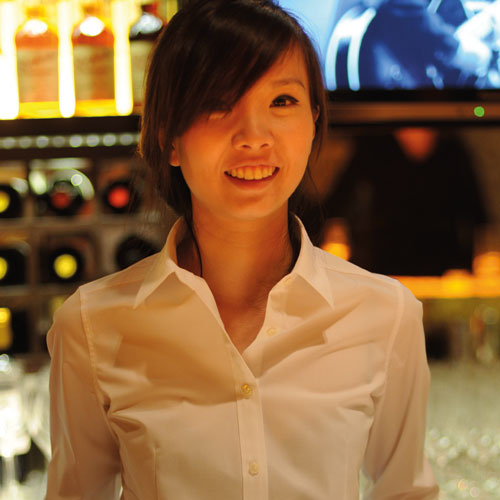Alicia Tivey (Top left corner)
Executive chef at The Moluccas Room
Her backstory: Tivey, who was raised in Bandung, has been cooking for the last 20 years. She’s also trained under the likes of Tetsuya Wakuda, who she says is such an amazingly supportive friend and boss that “it was almost as if he was the one who’d had the baby, not me.”
On being a woman in F&B: “You have to work harder and better to prove you can do it. But I take that as a challenge to beat the system. You have to see it in a positive way and just do the best you can. You become one of the boys. You talk like a guy, act like a guy, but once I end work, I snap out of it (fortunately for my husband). I think female chefs have better taste buds than men and a lighter touch.”
Advice for life: If it’s something you love, go for it. Remember, money can’t buy happiness.
Little-known fact: Tivey’s Indonesian mother’s punishment for her as a child was to make mayonnaise by hand.
Signature creation: Confit Sakura ayam tuturaga ($27). “I love Indonesian basil, and this Sakura chicken confit curry is fresh and light yet satisfying.”
 Shen Tan
Shen Tan
Chef and owner of Wok & Barrel
Her backstory: This born and bred, true-blue Singaporean is a late bloomer where cooking is concerned; self-taught Tan only learned to cook at the age of 27 out of sheer necessity during a stint in Sydney. She gave up her position as events director for Forbes in 2009 to set up a nasi lemak stall in Maxwell market.
On being a woman in F&B: “It depends on the context, hot kitchen vs. pastry kitchen, restaurant vs. hawker center. There isn’t the same gender divide or glass ceiling in a hawker context. I think women tend to think that they have to prove more than ever that we can hack it, but I don’t think that’s necessary. It’s your palate that matters, not if you can carry a 50-kg bag of rice. Then again, I’ve never worked in a kitchen where I wasn’t the boss.”
Advice for life: Work hard and really, really believe in yourself.
Little-known fact: Tan is a real beer monster and can easily drink most men under the table.
Signature creation: Beef rendang pizza ($13.90). “It’s an amalgamation of everything I’ve learned about cooking, combining different cuisines and techniques all in one."
 Tammy Mah
Tammy Mah
Executive pastry chef of the Garibaldi Group
Her backstory: One heck of a spunky individual (no, we’re not just talking about her spiffy hairdo), Mah hails from Malacca where her Peranakan granny first taught her to cook. After training at several restaurants and hotels in Singapore, the talented 28-year-old is now the executive pastry chef for the Garibaldi Group.
On being a woman in F&B: “When it comes to something as precise, tedious and sophisticated as pastry work, men’s pieces just aren’t as sleek and refined as a woman’s. That said, there are a lot of good pastry chefs who are men. There’s more acceptance and more women in the industry now, but in the past, some male chefs wouldn’t take on female trainees.”
Advice for life: When you’re humble and willing to learn, you’ll gain more than you put in.
Little-known fact: Mah may be a pastry chef, but she doesn’t have a sweet tooth at all.
Signature creation: Sweets Garibaldi’s fromage blanc (from $28). “It’s the first dessert I proposed to my head chef when I was a trainee and I think it really represents me.”
 Aubrey Sim
Aubrey Sim
Lead bartender at B28
Her backstory: Sim’s a local girl who first dipped her toe in the scene when she was just 19 while pursuing a BA in economics at NTU. Fast forward a few years, this relative newbie took the title for 2009’s Singapore World Class and has become one of the few prominent female bartenders in town.
On being a woman in F&B: “Females aren’t taken seriously right off the bat. You definitely have to prove yourself, that you can not only do exactly what the guys do, but do it just as well as them, better even. You also need to toughen up a little; it helps that I’ve never really been a girly girl. Customers trying to pick me up is a real job hazard.”
Advice for life: Know your stuff, have a good bank of knowledge and be disciplined.
Little-known fact: The very slim Sim eats a whole lot of chocolate and dessert. (We just want to know where it all goes.)
Signature creation: Old Fashioned ($35), with a twist. “I do this off-the-menu number with Ron Zacapa 23 and a dash of orange-chocolate bitters. It’s a great nightcap and really defines what my taste profile has evolved to as a mixologist.”























 Shen Tan
Shen Tan Tammy Mah
Tammy Mah Aubrey Sim
Aubrey Sim